The MUMC provides the full range of services needed to characterize complex microbial communities, including DNA extraction; 16S rRNA amplicon, ITS-based, or whole genome shotgun sequencing; informatics analysis, and data and sample storage. We have optimized our extraction processes for various biological samples from various host species, and are happy to work with users wishing to submit novel or unusual sample types. To date, we have successfully performed 16S rRNA amplicon sequencing of DNA extracted from feces (mouse, rat, zebrafish, cat, dog, horse, and human), ingesta collected at other gut regions (mouse jejunum, ileum, cecum; mouse and rat stomach contents), dermal swabs (cow udder), milk, bronchoalveolar lavage fluid (cat, dog), rodent cage bedding (aspen, corncob), yeast, soil, rodent chow, and feed additives. Through our affiliations with the MU Mutant Mouse Resource and Research Center (MMRRC) and Rat Resource and Research Center (RRRC), we are also able to offer rederivation of cryopreserved or fresh rodent germplasm into different surrogate dams, to generate isogenic animals harboring different gut microbial populations.
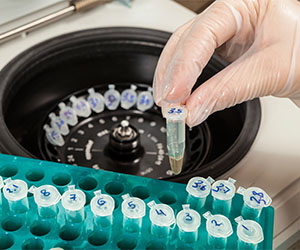
DNA Extractions
Using kit-based or traditional bench-top methods, we extract high-quality DNA suitable for next-generation sequencing from feces and other biological samples.
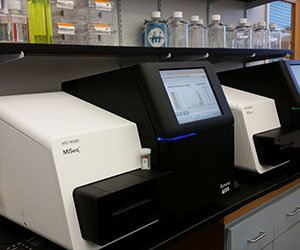
16S rRNA Sequencing
Following PCR-based amplification, 16S rRNA amplicons are sequenced using the Illumina MiSeq platform to characterize the taxonomy of complex polymicrobial samples.
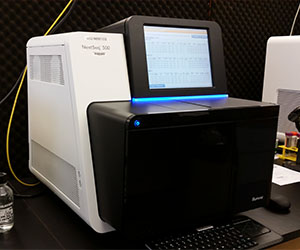
Whole Genome Shotgun Sequencing
Polymicrobial DNA is sheared and sequenced in a PCR-free, untargeted fashion using the Illumina HiSeq platform to characterize the metagenome of complex polymicrobial samples.
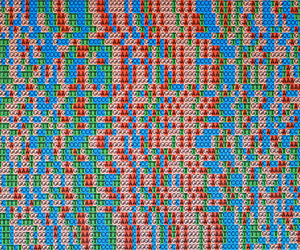
Informatics Analysis
Sequence data is filtered, trimmed, and annotated against a database of bacterial 16S or genomic sequence data to identify and quantify the relative abundance of all detected taxa.

Data Storage
Sequence data is stored in perpetuity and can be re-processed against updated microbial sequence databases at a later time.
Sequence data is stored in perpetuity and can be re-processed against updated microbial sequence databases at a later time.
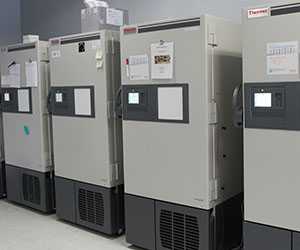
Sample Storage
Fecal and other biological samples can be stored long-term at -80°C as archival samples for subsequent characterization or transfer into colony founders.
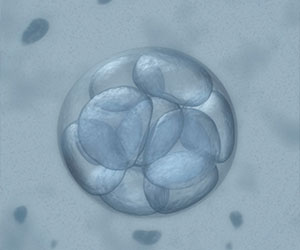
Rederivation
Working with the MU Mutant Mouse Resource and Research Center (MMRRC) and Rat Resource and Research Center (RRRC), germplasm of a desired genotype can be transferred into surrogate dams harboring a desired “enterotype”, to generate isogenic animals colonized with different gut microbial populations.
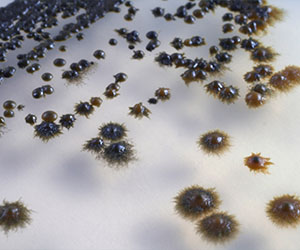
ITS-based Sequencing
Similar to 16S rRNA sequencing, PCR-based amplification and sequencing of the ITS2 region of fungal genomes allows for characterization of complex fungal communities.
Pricing
Package price includes DNA extraction, 16S rRNA amplicon library prep with single-indexed primers, sequencing using the Illumina MiSeq platform, annotation against two different 16S rRNA gene databases, and a comprehensive informatics analysis to determine richness, and α- and β-diversity.
| Non-profit | For profit | |
| Number of samples | Fee per sample* | |
| 1 to 3 | $300 | $450 |
| 4 to 6 | $175 | $262 |
| 7 to 24 | $125 | $187 |
| 24 to 48 | $115 | $172 |
| >48 | Please contact to discuss discount | |
*subtract $5/sample if extracted DNA is submitted. A minimum of 400 ng (determined via fluorometry) high-quality DNA is requested for optimal results. MUMC is not responsible for poor results (e.g., low coverage) obtained using user-supplied DNA.